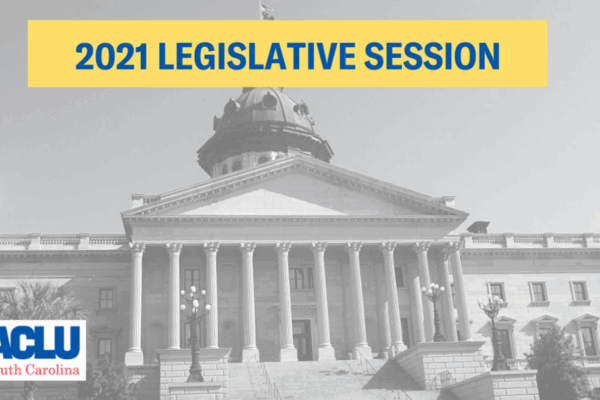Our political leaders have turned police into society’s “solution” for drug use, misbehaving children at school, homelessness, mental illness, and protests against these destructive policies, to name just a few. As a result, an estimated 1,212,190 people in South Carolina have an arrest or conviction record - nearly one in three adults (31%). In addition to the immediate harms of an arrest and charge, including potential incarceration and fines and fees, the collateral harms of a criminal conviction can last for years. It can result in the loss of employment, housing, financial aid eligibility, and child custody.
Today the Senate L.C.I. Professions and Occupations Subcommittee took a small step toward addressing these collateral harms. S.295 (Sen. Climer and Sen. Fanning) would ensure that professional regulatory boards or commissions may not deny applications for professional licenses due to prior criminal convictions unless the conviction is directly related to the profession. Further, the bill establishes a clear standard for review and criteria for consideration of criminal records by regulatory boards or commissions.
Second chances strengthen the safety of our communities. Employment is a key factor in reducing recidivism. Over 12% of South Carolina’s workforce was licensed by the state in 2015. More recently, the Institute for Justice found that 58.8 percent of 102 lower-income occupations are licensed in South Carolina. To reduce recidivism, South Carolina must remove unnecessary hurdles between people with criminal records and employment opportunities. This legislation offers a good step.
Second chance legislation makes economic sense. When an individual with a criminal record has a job, they will contribute more to the tax base, purchase more goods, and are less likely to commit a new crime, thus reducing the amount of money that state and local governments must spend on their criminal justice systems. It is estimated that our nation's economy loses over $372 billion each year in lost earning potential because of individuals’ involvement in the criminal justice system. To strengthen our economy, South Carolina lawmakers should support this bill.
Second chance legislation ensures South Carolina may deny a license to those whose criminal conviction is related to the job. This legislation ensures that the boards and commissions may deny a license if the conviction “directly relates to the duties and responsibilities of the occupation or profession for which the applicant is seeking a license.” Thus, the state retains the power to deny licenses when warranted.
The staggering racial bias in the enforcement of our criminal laws means the collateral harms of a criminal conviction fall on Black people. For example, in 2018 Black people in South Carolina were 3.5 times more likely to be arrested for marijuana possession when compared with whites, despite both groups using marijuana at roughly the same rate. And, this disparity is on the rise, up from 1.8 times more likely to be arrested in 2001 and 2.8 times more likely to be arrested in 2010. The discriminatory enforcement of South Carolina laws means that Black people are substantially more likely to face the immediate harms of a criminal record. This legislation would begin to dismantle the collateral harms of this reality.
This legislation is a win-win. It makes us safer, strengthens our economy, and better ensures that South Carolinians are judged on their merit, not their mistakes.

